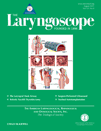Association of common variants, not rare mutations, in IRF6 With nonsyndromic clefts in a honduran population†
This work was supported by the Honduran Medical Institute and by a grant from the Doris Duke Charitable Foundation to Columbia University Medical Center. The authors have no other funding, financial relationships, or conflicts of interest to disclose.
Abstract
Objectives/Hypothesis:
Cleft lip with or without cleft palate (CL/P) is a common birth defect throughout the world. Linkage studies have shown interferon regulatory factor 6 (IRF6) to be associated with CL/P in multiple populations, including one in Honduras. It is unknown, however, whether rare sporadic mutations or common variants are the cause of this association, and reports exist supporting both hypotheses. Thus, it is important to determine the cause for this association in a Honduran population.
Study Design:
Case-control and family-based association studies.
Methods:
Families with two or more members affected by CL/P were identified. We collected DNA from affected and unaffected family members (608 total), and from 100 gender-matched controls from Honduras. We sequenced the exons of IRF6 for mutations in probands and controls. All patients were genotyped for single nucleotide polymorphisms (SNPs) rs642961 and rs2235371, which are proposed to have potential biological significance to IRF6 expression and function.
Results:
We found no mutations in IRF6 in our CL/P probands. We found a risk association with the G allele of rs2235371 in both case-control (P = .01) and family-based association (P = .01) studies. We found no association with either allele of rs642961.
Conclusions:
This study suggests that common variants, rather than rare mutations, are the cause for association between IRF6 and nonsyndromic CL/P. rs2235371, but not rs642961, shows association with CL/P, suggesting a functional role for this polymorphism in our Honduran population. rs642961 has been previously reported to have an effect in other populations, suggesting that different populations may be affected by different polymorphisms.




